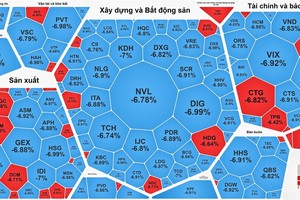Last year, investment attraction to Vietnam hit a record high of US$38 billion. In January this year, this figure continued to increase. According to the General Statistics Office of Vietnam, in January, there were 258 newly-registered FDI projects with total registered capital of $4.5 billion, an increase of 454 percent compared to the same period last year.
While newly-registered FDI capital increased, capital contribution activity of investors and investment expansion of existing enterprises declined. There were only 77 times of projects asking to adjust investment for additional capital of $334 million, down by nearly 2 percent, and 884 times of capital contribution and purchase of shares with a total capital of nearly $535 million, down nearly 30 percent compared to the same period last year.
Experts concerned that registered investment capital was unreal capital because the nature of investment activity is reflected through the figure of disbursed capital. The registered FDI capital in January was up to $4.5 billion but the disbursed FDI capital merely reached $1.6 billion, lower than the disbursement ratio of 2019. Although registered FDI capital posted an increase, disbursed capital was low, so investment efficiency was not as expected.
Investment attraction policies, including investment incentives and administrative reform, have been carried out well recently. The country has increased economic liberalization and market equality by reducing from 49 to six restricted business sectors and unifying the Investment Law and the Enterprise Law for all enterprises, without distinguishing economic sectors.
These activities have significantly improved the investment environment and attracted many investors in the world to Vietnam. However, anti-transfer pricing activities have not shown effectiveness, leading to the situation that large enterprises that have invested in Vietnam for many years but still have not paid taxes yet. The higher the corporate income tax, the more multinational corporations are seeking ways to transfer profits to their headquarters located in countries with low tax rates to evade taxes. Profit transferring is made through borrowing capital from the parent company or buying materials from the parent company at high prices.
Although tax authorities established many offices specialized in anti-transfer pricing, their operations were ineffective. Tax policies also have had many changes, including gradually reducing the corporate income tax from 32 percent in 1999 to 28 percent in 2004, to 25 percent in 2009, 22 percent in 2014, and 20 percent in 2016. However, the tax rate of 20 percent is still much higher compared to that of tax havens with zero to one percent tax rate. It is the reason that many large enterprises with huge revenues continuously expanded investment but still reported losses to avoid paying taxes in Vietnam. Many enterprises were collected and fined hundreds of billions of Vietnamese dong of tax arrears after being inspected.
Therefore, to attract investment to achieve the goal of increasing the national budget, it requires changes in policies and stronger solutions, such as imposing tariffs on materials or on products to limit transfer pricing as some countries have applied. Thereby, authorities will be able to prevent enterprises from avoiding paying taxes. At the same time, enterprises that report losses but still expand production need to be inspected constantly.
While newly-registered FDI capital increased, capital contribution activity of investors and investment expansion of existing enterprises declined. There were only 77 times of projects asking to adjust investment for additional capital of $334 million, down by nearly 2 percent, and 884 times of capital contribution and purchase of shares with a total capital of nearly $535 million, down nearly 30 percent compared to the same period last year.
Experts concerned that registered investment capital was unreal capital because the nature of investment activity is reflected through the figure of disbursed capital. The registered FDI capital in January was up to $4.5 billion but the disbursed FDI capital merely reached $1.6 billion, lower than the disbursement ratio of 2019. Although registered FDI capital posted an increase, disbursed capital was low, so investment efficiency was not as expected.
Investment attraction policies, including investment incentives and administrative reform, have been carried out well recently. The country has increased economic liberalization and market equality by reducing from 49 to six restricted business sectors and unifying the Investment Law and the Enterprise Law for all enterprises, without distinguishing economic sectors.
These activities have significantly improved the investment environment and attracted many investors in the world to Vietnam. However, anti-transfer pricing activities have not shown effectiveness, leading to the situation that large enterprises that have invested in Vietnam for many years but still have not paid taxes yet. The higher the corporate income tax, the more multinational corporations are seeking ways to transfer profits to their headquarters located in countries with low tax rates to evade taxes. Profit transferring is made through borrowing capital from the parent company or buying materials from the parent company at high prices.
Although tax authorities established many offices specialized in anti-transfer pricing, their operations were ineffective. Tax policies also have had many changes, including gradually reducing the corporate income tax from 32 percent in 1999 to 28 percent in 2004, to 25 percent in 2009, 22 percent in 2014, and 20 percent in 2016. However, the tax rate of 20 percent is still much higher compared to that of tax havens with zero to one percent tax rate. It is the reason that many large enterprises with huge revenues continuously expanded investment but still reported losses to avoid paying taxes in Vietnam. Many enterprises were collected and fined hundreds of billions of Vietnamese dong of tax arrears after being inspected.
Therefore, to attract investment to achieve the goal of increasing the national budget, it requires changes in policies and stronger solutions, such as imposing tariffs on materials or on products to limit transfer pricing as some countries have applied. Thereby, authorities will be able to prevent enterprises from avoiding paying taxes. At the same time, enterprises that report losses but still expand production need to be inspected constantly.
























